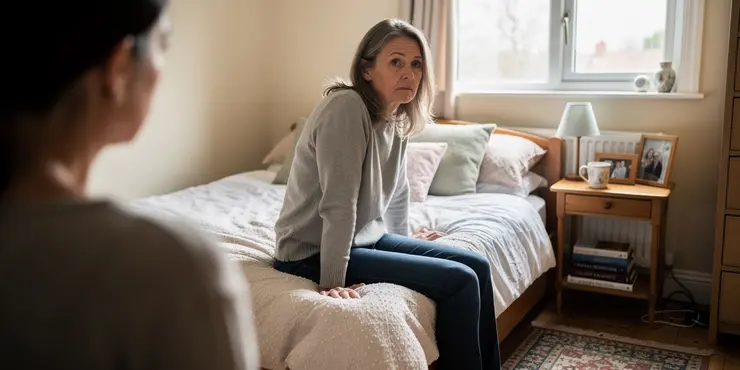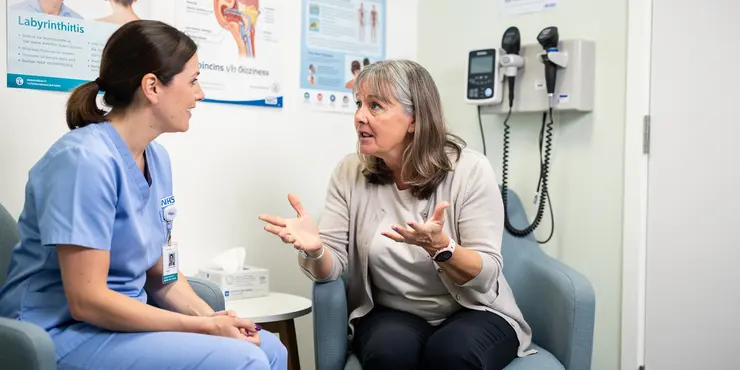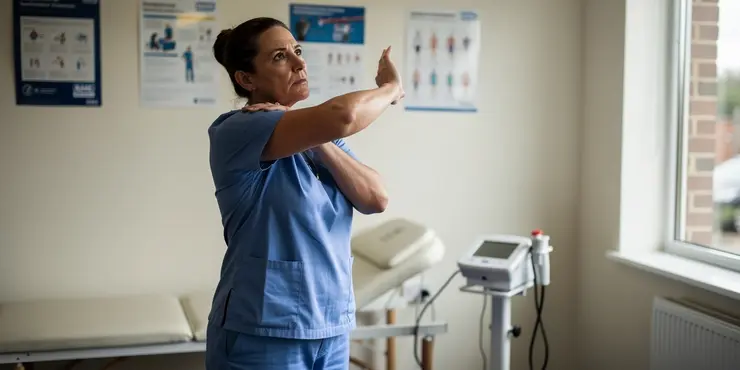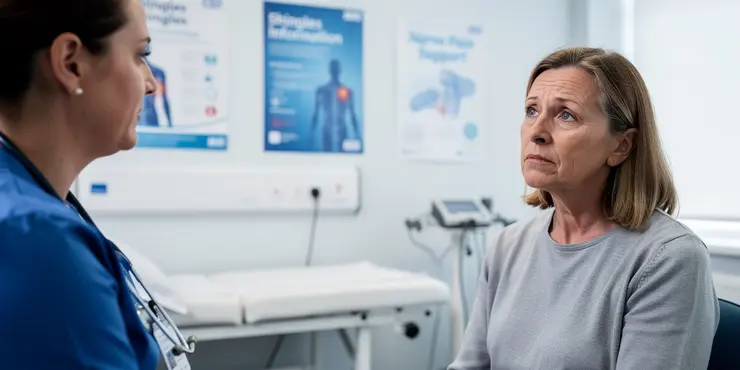Find Help
More Items From Ergsy search
-

Labyrinthitis and Vertigo (BPPV): Hazel's story | NHS
Relevance: 100%
-

Labyrinthitis and Vertigo (BPPV): Hazel's story | NHS
Relevance: 98%
-

Neck Exercises
Relevance: 5%
-
What are the symptoms of methanol poisoning?
Relevance: 5%
-
Can tinnitus be a symptom of a more serious condition?
Relevance: 5%
-

Are there any complications associated with shingles?
Relevance: 5%
-
What causes tinnitus?
Relevance: 2%
Labyrinthitis and Vertigo (BPPV): Hazel's Story
Understanding Labyrinthitis
Labyrinthitis is an inner ear disorder characterised by inflammation of the labyrinth, a structure crucial for hearing and balance. Symptoms often include dizziness, vertigo, hearing loss, and sometimes tinnitus (ringing in the ears). This condition disrupts the normal sensory signals the brain receives concerning balance and spatial orientation.
What is Benign Paroxysmal Positional Vertigo (BPPV)?
Benign Paroxysmal Positional Vertigo (BPPV) is another form of vertigo, caused by tiny calcium particles accumulating in the inner ear canals. It can lead to brief episodes of mild to intense dizziness, especially triggered by head movements. Although unsettling, BPPV is generally not serious and can be treated efficiently.
Hazel’s Journey with Labyrinthitis and BPPV
Hazel, a resident of the United Kingdom, began experiencing severe dizziness and balance issues last year. After consultations and diagnostic tests through the NHS, Hazel was diagnosed with Labyrinthitis. She recalls, "It felt like the room was spinning, and even simple tasks became daunting."
Her condition was further complicated by episodes of BPPV. "I had sudden, brief spells of vertigo whenever I moved my head. It was frightening at first," Hazel says. With the assistance of her GP and ENT specialist, Hazel was guided through a series of vestibular rehabilitation exercises aimed at restoring balance and normal function.
The NHS’s Role in Hazel's Recovery
The support Hazel received from the NHS was instrumental in her recovery. She was provided with a comprehensive care plan, which included medications to reduce inflammation and physiotherapy exercises to mitigate the effects of BPPV. Hazel emphasizes the importance of seeking professional help early, "The sooner you get a diagnosis and start treatment, the better your chances of a full recovery."
Conclusion
Labyrinthitis and BPPV can significantly impact daily life, but with timely medical intervention and support from services like the NHS, effective management and recovery are achievable. Hazel’s story is a testament to the resilience of individuals and the vital role of healthcare systems in providing essential care.
Labyrinthitis and Vertigo (BPPV): Hazel's Story | NHS
Labyrinthitis and Benign Paroxysmal Positional Vertigo (BPPV) are conditions that affect the inner ear, potentially causing severe dizziness and balance issues. In the UK, these conditions are more common than many might assume and can significantly impact daily life. Hazel, a resident of Birmingham, shares her journey with labyrinthitis and vertigo, providing insight and hope to others navigating similar challenges.
Understanding Labyrinthitis
Labyrinthitis is an inner ear disorder which leads to inflammation of the labyrinth, the part of the ear that helps control balance. This inflammation can cause sudden dizziness, vertigo, and sometimes hearing loss. Hazel experienced her first episode of labyrinthitis in her early 50s. She recounts feeling a sudden spinning sensation that left her disoriented. "It was as if the room was swirling around me," she recalls. After consulting her GP, Hazel learned her vertigo stemmed from a viral infection causing inflammation.
Exploring Vertigo (BPPV)
Benign Paroxysmal Positional Vertigo (BPPV) is another common cause of vertigo. It occurs when tiny calcium particles dislodge and move into the ear canals, impacting balance. Hazel describes her experience with BPPV as unsettling. "Walking down the stairs became terrifying," she said. With BPPV, certain head movements trigger episodes of dizziness, often lasting less than a minute but intensely disrupting.
Hazel's Path to Recovery
Treatment for labyrinthitis and BPPV varies but often includes medications and vestibular rehabilitation. Hazel's recovery involved a combination of prescribed medication and physiotherapy exercises tailored to manage her balance issues. "The exercises at home were crucial," she notes. Hazel also highlights the importance of seeking support from healthcare professionals and family. "You're not alone, and help is available," she advises.
NHS Support and Resources
In the UK, the NHS provides essential support for individuals with labyrinthitis and BPPV. Hazel encourages others to consult their local GP if they experience symptoms and stresses the importance of early diagnosis. The NHS website offers valuable resources and guidance on managing these conditions effectively. Hazel's story is a testament to the resilience and support people need to navigate life with these inner ear disorders.
Labyrinthitis and Vertigo (BPPV): Hazel's Story
Understanding Labyrinthitis
Labyrinthitis is when the inside of your ear gets swollen. This part of the ear helps you hear and keeps your balance. If you have Labyrinthitis, you might feel dizzy, like you are spinning, have trouble hearing, or hear ringing in your ears. This makes it hard for your brain to know what's up and down.
What is Benign Paroxysmal Positional Vertigo (BPPV)?
BPPV is when tiny bits of calcium in your ear cause you to feel like you’re spinning. This happens when you move your head. These dizzy feelings can be scary, but BPPV can be fixed with help from a doctor.
Hazel’s Journey with Labyrinthitis and BPPV
Hazel lives in the UK. Last year, she started feeling very dizzy and had trouble balancing. She went to doctors in the NHS, who told her she had Labyrinthitis. "It felt like the room was spinning," Hazel says. "Even easy things were hard to do."
Hazel also had BPPV. "Whenever I moved my head, I felt like I was spinning for a short time, which was scary," she explains. Her doctor and an ear specialist gave Hazel exercises to help her balance and feel better.
The NHS’s Role in Hazel's Recovery
The NHS helped Hazel get better. They made a plan with medicine to help her ear and special exercises for her dizziness. Hazel says it’s important to see a doctor quickly, "The sooner you find out what's wrong and start to fix it, the quicker you get better."
Conclusion
Having Labyrinthitis or BPPV can make life hard. But, with help from doctors and services like the NHS, you can manage it and get better. Hazel shows us how strong people can be and how important good healthcare is.
Tip: Drawing pictures or using apps that show balance can help understand these conditions better.
Labyrinthitis and Vertigo (BPPV): Hazel's Story | NHS
Labyrinthitis and Benign Paroxysmal Positional Vertigo (BPPV) are problems with the inner ear. They can make you feel very dizzy and cause trouble with balance. In the UK, these problems happen more often than people think. They can make daily life hard. Hazel, who lives in Birmingham, tells her story about living with labyrinthitis and vertigo. She wants to help others who have the same problems.
Understanding Labyrinthitis
Labyrinthitis is a problem inside your ear that causes parts of your ear to swell. This part helps you keep your balance. When it swells, it can make you feel dizzy and like the world is spinning. You might also have trouble hearing. Hazel first felt labyrinthitis in her early 50s. She felt like the room was spinning around her and was confused. Her doctor told her a virus had caused the swelling in her ear.
Exploring Vertigo (BPPV)
Benign Paroxysmal Positional Vertigo (BPPV) is another reason for vertigo. It happens when tiny bits of calcium move into the wrong part of your ear. This causes balance problems. Hazel says BPPV made her feel scared. "Going down the stairs was frightening," she said. With BPPV, certain head movements make you dizzy for a short time, but it feels very strong.
Hazel's Path to Recovery
There are different treatments for labyrinthitis and BPPV. Doctors might give medicine and exercises to help. Hazel got better by taking medicine and doing exercises at home. "The exercises were very important," she said. She also talks about getting help from doctors and family. "You are not alone, and there is help," she shares.
NHS Support and Resources
In the UK, the NHS gives important help for people with labyrinthitis and BPPV. Hazel says to talk to your local doctor if you have symptoms. Finding out early is important. The NHS website has lots of useful information to help manage these problems. Hazel's story shows how strong people can be with help when living with these ear problems.
Frequently Asked Questions
What is labyrinthitis?
Labyrinthitis is an inner ear infection that causes inflammation of a delicate part of your ear called the labyrinth. It can affect your hearing and balance.
What are the symptoms of labyrinthitis?
Symptoms of labyrinthitis include dizziness, feeling unsteady or off balance, hearing loss, and tinnitus. Some people may also experience nausea and vomiting.
How is labyrinthitis diagnosed?
A doctor may diagnose labyrinthitis based on your symptoms and medical history. They might perform a physical examination and hearing test, and sometimes recommend further tests to rule out other conditions.
What is BPPV?
BPPV, or Benign Paroxysmal Positional Vertigo, is a condition that causes brief episodes of dizziness when you move your head in certain positions. It occurs when tiny calcium particles clump up in the canals of the inner ear.
How is BPPV different from labyrinthitis?
While both conditions affect balance and cause dizziness, labyrinthitis is due to inflammation, often from an infection, and typically involves more continuous vertigo, whereas BPPV is due to mechanical issues in the ear and causes brief, positional episodes.
What causes labyrinthitis?
Labyrinthitis is often caused by a viral or bacterial infection. Viral labyrinthitis is more common and can follow a cold or flu.
How is labyrinthitis treated?
Treatment for labyrinthitis may include vestibular rehabilitation therapy, medications to relieve symptoms like nausea or dizziness, and occasionally antibiotics if a bacterial infection is suspected.
Can labyrinthitis cause permanent damage?
Most people recover fully from labyrinthitis, though some may experience ongoing dizziness or balance problems. Hearing loss from labyrinthitis is often temporary but can be permanent in some cases.
What is the role of vestibular rehabilitation therapy?
Vestibular rehabilitation therapy is a type of physical therapy aimed at helping you maintain balance and reduce dizziness. It’s often recommended for people with chronic symptoms of labyrinthitis or BPPV.
How can I prevent labyrinthitis?
Preventing labyrinthitis involves minimizing the risk of infections, such as by practicing good hygiene and getting vaccinated against flu and other preventable diseases.
What should I do during a vertigo episode?
If experiencing vertigo, you should sit or lie down immediately, try to stay still, and focus on a spot. Avoid sudden movements, and follow any specific instructions provided by your healthcare provider.
Is labyrinthitis a common condition?
Labyrinthitis is relatively uncommon but can affect people of any age, usually following an upper respiratory tract infection.
Are there long-term effects of untreated BPPV?
While BPPV is not life-threatening, untreated symptoms can increase the risk of falls and affect daily activities. It’s advisable to seek treatment to manage symptoms effectively.
What lifestyle changes can help manage labyrinthitis?
Lifestyle changes that may help include avoiding alcohol, reducing caffeine intake, quitting smoking, and ensuring a nutritious diet to support overall health. Staying active is also important for recovery.
Can stress worsen labyrinthitis symptoms?
Stress does not cause labyrinthitis but can exacerbate symptoms like dizziness and tinnitus. Managing stress through mindfulness or relaxation techniques may assist in symptom management.
What is labyrinthitis?
Labyrinthitis is an illness. It can make you feel dizzy and make your ears ring. This happens because there is a problem inside your ear. The ear helps you keep your balance.
If you have labyrinthitis, you might also feel sick or have trouble hearing.
If you think you have labyrinthitis, it is a good idea to talk to a doctor. They can help you feel better.
Using headphones to listen to calming music can help. Listening to someone read this to you might also be helpful.
Labyrinthitis is when the inside part of your ear gets infected. This part is called the labyrinth. It can make it hard for you to hear and stay balanced.
What happens if you have labyrinthitis?
Labyrinthitis can make you feel dizzy and wobbly. You might have trouble keeping your balance. Sometimes, it can make it hard to hear, or you might hear a ringing sound called tinnitus. It can also make you feel sick to your stomach and you might throw up.
Here are some tips to help: - Sit still and rest if you feel dizzy. - Use a cane if you have trouble balancing. - Keep noise low to help your ears feel better. - Drink water and eat plain foods if your stomach feels upset.How do doctors find out if someone has labyrinthitis?
Doctors can use different ways to see if a person has labyrinthitis:
- Ask questions: The doctor will ask how you feel and what symptoms you have.
- Look in your ears: They might look inside your ears with a special tool.
- Balance tests: The doctor may do simple tests to check your balance.
- Hearing tests: They might check how well you can hear.
- Other tests: Sometimes, doctors do other tests to be sure.
If it's hard to understand or remember, ask someone to go with you to the doctor. You can also write down any questions or things you want to remember.
The doctor can find out if you have labyrinthitis by looking at your symptoms and asking about your health in the past. They might check your body and test your hearing. Sometimes, they might do more tests to make sure it is not something else.
If you find reading hard, you can ask someone to help you. You can also use tools that read the text out loud or help you understand words.
What is BPPV?
BPPV is when tiny crystals in your inner ear move and make you feel dizzy. It can happen when you move your head. If you feel dizzy often, ask a doctor for help.
Tip: Use a family member or a friend to help explain. Try drawing pictures to understand better.
BPPV stands for Benign Paroxysmal Positional Vertigo. It makes people feel dizzy for a short time when they move their head in certain ways. This happens because tiny bits of calcium get stuck in the inner ear.
Try these helpful tips:
- Move your head slowly when getting up or lying down.
- Ask a doctor for exercises to help with dizziness.
- Use support tools like handrails or a walking stick if needed.
How is BPPV different from labyrinthitis?
BPPV and labyrinthitis are both problems in the inner ear that can make you feel dizzy. But they are not the same.
BPPV:
- BPPV happens when tiny crystals in your ear move to the wrong place.
- It makes you feel dizzy when you move your head.
- It usually lasts a short time.
Labyrinthitis:
- Labyrinthitis is caused by swelling in your inner ear.
- It makes you feel dizzy and can also make you feel sick.
- It might last longer than BPPV.
If reading is hard, you can:
- Use a ruler or finger to keep your place when reading.
- Read out loud, or ask someone to read with you.
- Take breaks if you start feeling tired.
Both conditions can make you feel dizzy and off-balance. Labyrinthitis is when your ear gets swollen because of an infection. This makes you feel dizzy a lot of the time. BPPV happens when tiny pieces in your ear move around. This causes you to feel dizzy for a short time when you move your head in certain ways.
What makes labyrinthitis happen?
Labyrinthitis is when part inside your ear gets swollen. This part helps you balance. Here are some things that can make it happen: - A cold or the flu. - An infection caused by a virus or bacteria. - Stress or being very tired. If you have labyrinthitis, your ear might hurt or feel strange. You could also feel dizzy. Tools that can help: - Use simple pictures to understand. - Ask someone to help explain if you need.Labyrinthitis is when the inner ear gets swollen. This can happen because of a virus or bacteria. Viruses are small germs that can make you sick. Bacteria are tiny living things that can cause infections. It is more common to get labyrinthitis from a virus. This can happen after you have a cold or the flu.
How do you treat labyrinthitis?
If you have labyrinthitis, you might feel dizzy or sick. Here’s how you can feel better:
- Rest when you feel dizzy. Sit or lie down until it passes.
- Avoid bright lights and loud noises. They can make you feel worse.
- Ask a doctor for medicine. It can help with dizziness and sickness.
- Drink plenty of water. It stops you from getting dehydrated.
- Try balance exercises. A doctor can show you how. They help you get steady again.
Use headphones for calming music or wear sunglasses inside if lights bother you. These can help you feel more comfortable.
If you have labyrinthitis, there are different ways to help you feel better. You might do special exercises called vestibular rehabilitation to help with balance. You can also take medicine to stop feeling sick or dizzy. If the problem is because of germs, the doctor might give you medicine to fight those germs.
Can labyrinthitis cause long-lasting problems?
Labyrinthitis is when part of your inner ear gets swollen. This can make you feel dizzy or have trouble hearing.
In most cases, labyrinthitis gets better on its own. Some people feel better after a few weeks.
But sometimes, labyrinthitis can cause long-lasting problems with balance or hearing.
If you feel dizzy or your ear hurts for a long time, you should see a doctor.
Some people find it helpful to use a walking stick or have someone with them if they feel dizzy. You can also try simple balance exercises. Ask a doctor or therapist for exercises that can help.
Most people get all better when they have labyrinthitis. But sometimes, they might still feel dizzy or have trouble balancing. Hearing loss from labyrinthitis usually goes away, but sometimes it stays forever.
What does vestibular rehabilitation therapy do?
Vestibular rehabilitation therapy helps people who feel dizzy or off balance. It is a special type of exercise program.
This therapy helps your brain and body work together better. It helps you feel steadier when you walk or move.
If you have trouble with balance, this therapy can make you feel safer and more confident.
Tools that can help include videos that show exercises, or working with a therapist.
Vestibular rehabilitation therapy is a type of exercise that helps you balance better and feel less dizzy. It’s good for people who often feel dizzy because of ear problems like labyrinthitis or BPPV.
How can I stop getting labyrinthitis?
You can help stop labyrinthitis by stopping infections. Wash your hands to keep clean, and get your flu shots and other important vaccines.
What should I do if I feel dizzy?
If you feel dizzy, try to sit or lie down right away. This can help keep you safe.
Close your eyes and take deep breaths. This may make you feel better.
Try to stay calm. Tell someone you feel dizzy so they can help you.
If you need more help, call a doctor.
If you feel dizzy, sit or lie down right away. Try to stay very still. Look at one spot to help you feel better. Don’t move too quickly. Listen to what your doctor has told you to do.
Is labyrinthitis common?
Labyrinthitis is not something that many people get. It is a condition that affects the ear and might make you feel dizzy.
If you are dizzy or have ear problems, it is a good idea to see a doctor. They can help you feel better.
Using simple words and pictures can help you understand more about this condition. You can also ask someone to explain it to you.
Labyrinthitis does not happen often. It can make people feel sick after they have a cold or a cough. Anyone can get it.
What happens if BPPV is not treated for a long time?
BPPV is not dangerous, but if you don't treat it, it can make you more likely to fall and make daily life harder. It's a good idea to get help to make the symptoms better.
What can you do to help feel better if you have labyrinthitis?
Labyrinthitis can make you feel dizzy and unwell. Here are some simple things you can do to feel better:
- Rest: Make sure to get plenty of sleep and take breaks when you feel tired.
- Stay Hydrated: Drink lots of water to help your body.
- Limit Loud Noises: Try to avoid loud places that can make dizziness worse.
- Avoid Bright Lights: Bright lights can make you feel dizzy, so keep lights soft if you can.
- Eat Healthy: Eating fruits, vegetables, and other healthy foods can help your body recover.
- Move Slowly: Stand up or turn your head slowly so you don’t feel too dizzy.
These tips can help you manage labyrinthitis better. If it is too hard, ask someone to help you or talk to a doctor.
Making changes in your life can help. Try to not drink alcohol. Drink less drinks with caffeine, like coffee and soda. Stop smoking if you can. Eat healthy food to keep your body strong. Moving your body and staying active is also good. This can help you feel better.
Can stress make labyrinthitis symptoms worse?
Labyrinthitis is a problem in the ear that can make you feel dizzy and unsteady.
Stress can make you feel more tired and upset, which might make labyrinthitis symptoms feel worse.
Here are some things that might help:
- Relax – try deep breathing or listening to calm music.
- Rest – make sure you get enough sleep.
- Ask for help – talk to a doctor or a friend if you feel stressed.
Being stressed does not make labyrinthitis happen, but it can make you feel more dizzy or hear ringing in your ears. Doing things like mindfulness or relaxing can help you feel better.
Useful Links
This website offers general information and is not a substitute for professional advice.
Always seek guidance from qualified professionals.
If you have any medical concerns or need urgent help, contact a healthcare professional or emergency services immediately.
Some of this content was generated with AI assistance. We’ve done our best to keep it accurate, helpful, and human-friendly.
- Ergsy carfully checks the information in the videos we provide here.
- Videos shown by Youtube after a video has completed, have NOT been reviewed by ERGSY.
- To view, click the arrow in centre of video.
- Most of the videos you find here will have subtitles and/or closed captions available.
- You may need to turn these on, and choose your preferred language.
- Go to the video you'd like to watch.
- If closed captions (CC) are available, settings will be visible on the bottom right of the video player.
- To turn on Captions, click settings .
- To turn off Captions, click settings again.
More Items From Ergsy search
-

Labyrinthitis and Vertigo (BPPV): Hazel's story | NHS
Relevance: 100%
-

Labyrinthitis and Vertigo (BPPV): Hazel's story | NHS
Relevance: 98%
-

Neck Exercises
Relevance: 5%
-
What are the symptoms of methanol poisoning?
Relevance: 5%
-
Can tinnitus be a symptom of a more serious condition?
Relevance: 5%
-

Are there any complications associated with shingles?
Relevance: 5%
-
What causes tinnitus?
Relevance: 2%

